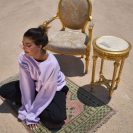This month I am introducing you to a word-wizard named Tara Jeana. It’s October. In most countries, winds are blowing, leaves are falling. And Tara’s writing, aptly, will also blow you away. Her stories, though poignant and at times graphic, are tempered with messages of love. Tara is acutely aware of life’s darkness, but she remains compassionate and present.
As an English teacher, does your strong command of language facilitate writing or is it a hindrance?
I am in love with language—I think all writers sort of have to be. I do have a solid grounding in English, and because of that, I am more confident in writing with a certain style, in breaking grammatical rules with long, loose dangling sentences and hanging silences. I believe that the power of language lies not within its rules but in how much farther beyond the boundaries one is willing to go with it.
The message of love underlies your work, even those with violent themes. What can you tell us about the power of love?
I am one of those fanatic romantics that truly believe in the power of love. It is a deeply unifying force that lies within our fine grains of flesh. And everyone—every single soul—has it layered, sometimes deeply, within him, her.
Sometimes you highlight the obscene in your work. Why do you think many writers shy away from this?
I think that all writers write because they have a love of the craft. Often, I write because I am compelled to. In this way, I can’t help but explore the grotesque, the pain-ridden. This is overwhelming and painful, diving into the dark crevices of life, and sometimes, it is just too much. Perhaps that is why some writers do not explore this aspect of living. To do so, you have to immerse yourself in death. And that is a terrifying way to approach art. It is a terrifying way to live.
As a Canadian living in the Middle East, in what way has your writing changed since moving to this region?
The Middle East has moved me in so many significant ways! I am enamored with the idea of ‘the other’ and no people or culture in the world is ‘othered’ like Middle Easterners. I feel like I need to explore this region and its people to truly understand life, love, hope and despair. I want to know what it is like behind the veil or in the kitchen of a Kuwaiti family. This is my need as a writer and as a person—to recognize the humanity and the similarities in someone with a different set of beliefs and cultural practices, and to embrace each other as people that need to be loved. By exploring the world and its people we get to know more of ourselves. Writing is so revealing that way: it opens up the soul in a new and beautiful way.
Do you believe in writer’s block?
Yes, but not in a conventional sense. I think people experience moments of fullness and also times of feeling empty, all used up. We are all vessels. Writer’s block, like any other downward turn, is the process of being emptied or feeling dry. As surely as there are times of drought, there will also be periods of rainfall, monsoons. The lesson is to persevere, to continue dancing for rain and hope for the skies to open eventually.
Finally, you have started combining photography and poetry – an art form known as ekphrasis. What can you tell us about this medium?
I do not claim to be a photographer, but I see a lot of beauty worth capturing. Words and images go together well as they both evoke strong emotions. It made sense for me to put poetry to images —to analyze the world from a poet’s perspective and allow myself to be moved by what I was seeing. After all, isn’t this the burden of the writer: to watch the world spin off its axis, and then record—painfully, laboriously— the calamity that results?
You can follow Tara Jeana on Facebook and Instagram . Her work is also available on her website www.tarajeana.com.








